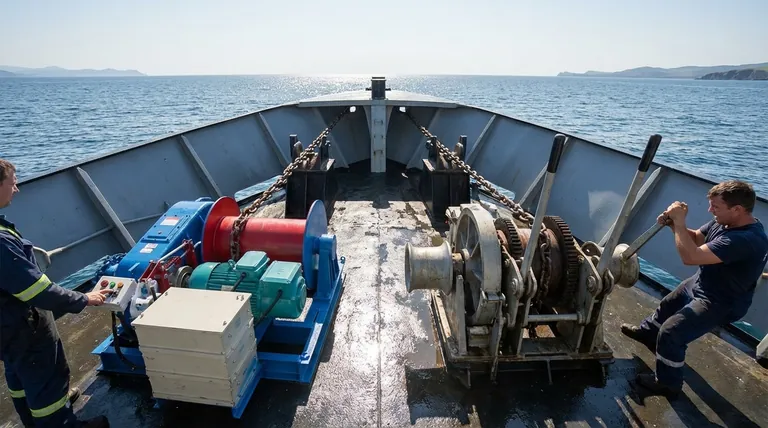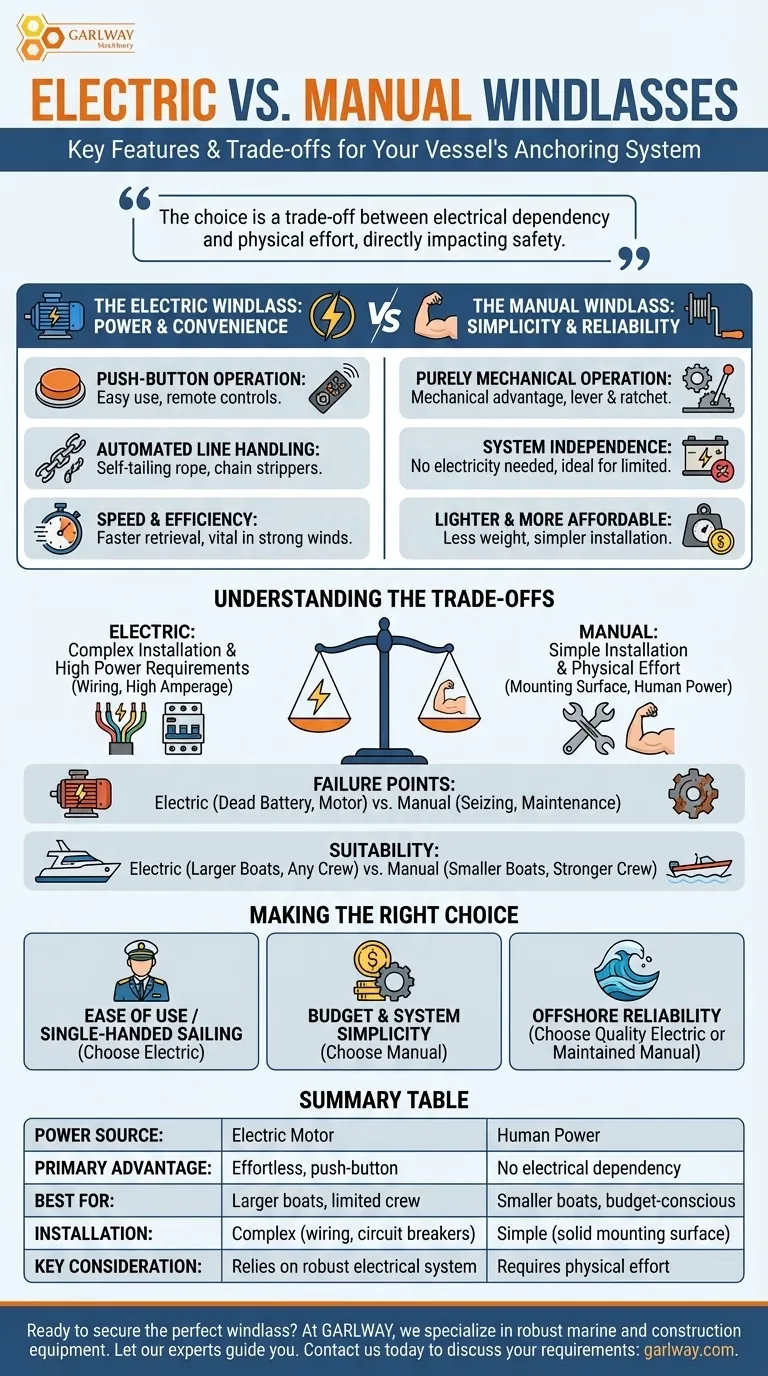At their core, the defining feature of an electric windlass is its use of a motor for power-assisted anchor retrieval at the push of a button. In contrast, a manual windlass is a purely mechanical device that relies entirely on human power, operated by turning a handle or pumping a lever to raise the anchor.
The choice between an electric and manual windlass is a fundamental decision about your boat's systems. It's not just about convenience; it's a trade-off between electrical dependency and physical effort, directly impacting how you manage one of your vessel's most critical safety systems.

The Electric Windlass: Power and Convenience
An electric windlass is designed to minimize the physical strain of anchoring, making the process faster and more manageable, especially with a limited crew.
Push-Button Operation
The primary advantage is ease of use. The anchor can be raised simply by pressing a button, often from multiple locations.
Many electric models offer remote controls, allowing the skipper to operate the windlass from the helm or another position, providing a better view of the anchoring process.
Automated Line Handling
Modern electric windlasses often include features that manage the anchor rode automatically.
Self-tailing features for nylon rope will take in the slack and feed it below deck. For all-chain rodes, a chain stripper is a common component that helps pull the chain from the gypsy and guide it into the anchor locker.
Speed and Efficiency
An electric motor retrieves ground tackle significantly faster than a person can by hand. This speed is a major advantage in strong winds or currents when you need to reposition or depart quickly.
The Manual Windlass: Simplicity and Reliability
A manual windlass is the choice for boaters who prioritize simplicity, reliability, and independence from a vessel's electrical system.
Purely Mechanical Operation
Its function relies on simple mechanical advantage. By oscillating a long lever, the operator engages a pawl into a ratchet mechanism, turning the gypsy and raising the anchor with manageable effort.
The key moving parts are the clutch, which engages the axle, and the lever mechanism. This simplicity reduces potential points of failure.
System Independence
Because it requires no electricity, a manual windlass is ideal for boats with limited battery capacity or no onboard generator. It will function reliably regardless of the state of your electrical system.
Lighter and More Affordable
Without the weight of a motor and gearbox, manual windlasses are considerably lighter and less expensive than their electric counterparts. Installation is also simpler as it requires no complex wiring.
Understanding the Trade-offs
Choosing a windlass involves weighing the benefits of automation against the virtues of simplicity.
Installation and Power Requirements
An electric windlass requires a robust electrical system. This includes heavy-gauge wiring run from a battery bank capable of handling high amperage loads, plus a dedicated circuit breaker.
A manual windlass only requires a solid mounting surface, making its installation far less complex and invasive.
Failure Points and Redundancy
The primary drawback of an electric windlass is its reliance on power. A dead battery, corroded connection, or motor failure can render it inoperable. Critically, some models lack a built-in emergency manual override.
While mechanically simpler, a manual windlass is not immune to failure. Seizing due to corrosion or lack of maintenance can be a significant issue, particularly on long passages.
Suitability for Vessel and Crew
The physical effort required for a manual windlass makes it less suitable for larger boats with heavy anchors and chain.
An electric windlass makes anchoring accessible for any crew member, regardless of physical strength, which is a major benefit for single-handed or short-handed sailing.
Making the Right Choice for Your Boat
Your decision should be based on your boat's infrastructure, your budget, and your typical sailing style.
- If your primary focus is ease of use or single-handed sailing: An electric windlass is the clear choice for its speed and effortless operation.
- If your primary focus is budget, system simplicity, or outfitting a smaller boat: A manual windlass offers robust, power-independent functionality at a lower cost.
- If your primary focus is offshore reliability: The choice is nuanced. A high-quality, well-maintained electric model can be very reliable, while a simple, regularly serviced manual windlass offers independence from electrical failure.
Ultimately, the best windlass is the one that aligns perfectly with your vessel's capabilities and how you intend to use it.
Summary Table:
| Feature | Electric Windlass | Manual Windlass |
|---|---|---|
| Power Source | Electric Motor | Human Power |
| Primary Advantage | Effortless, push-button operation | No electrical dependency |
| Best For | Larger boats, limited crew, ease of use | Smaller boats, budget-conscious, system simplicity |
| Installation | Complex (wiring, circuit breakers) | Simple (solid mounting surface) |
| Key Consideration | Relies on a robust electrical system | Requires physical effort to operate |
Ready to secure the perfect windlass for your vessel?
At GARLWAY, we specialize in robust marine and construction equipment. While our expertise in durable machinery like winches, concrete mixers, and batching plants is renowned among global construction companies and contractors, we understand the critical importance of reliable systems.
Let us help you assess your needs for a dependable anchoring solution. Our team can guide you toward equipment that offers the right balance of power, simplicity, and durability for your specific application.
Contact our experts today to discuss your requirements and ensure your operations run smoothly and safely.
Visual Guide

Related Products
- Electric Hoist Winch Boat Anchor Windlass for Marine Applications
- Heavy Duty Electric Boat Winch Windlass Anchor
- Warn Winch Windlass Boat Trailer Winch
People Also Ask
- What is a marine load out and how are winches used in this process? | Essential Guide for Heavy Transport
- What are the differences between small and large winch drums? Optimize Your Pulling Power & Space
- How is the quick winch typically configured in construction applications? Essential Setup for Safe & Efficient Lifting
- What are the rated speeds of slow-speed and high-speed winches? A Guide to Choosing for Control or Efficiency
- How does motion speed influence lubricant selection for a building electric hoist?
- What safety advantages do electric winches provide? Enhance Operator Safety with Remote Control
- What are the common applications of electric winches? Power Your Lifting & Pulling Tasks
- What technique can help when removing bushes or small trees with a winch? The Power of Water for Easier Removal


